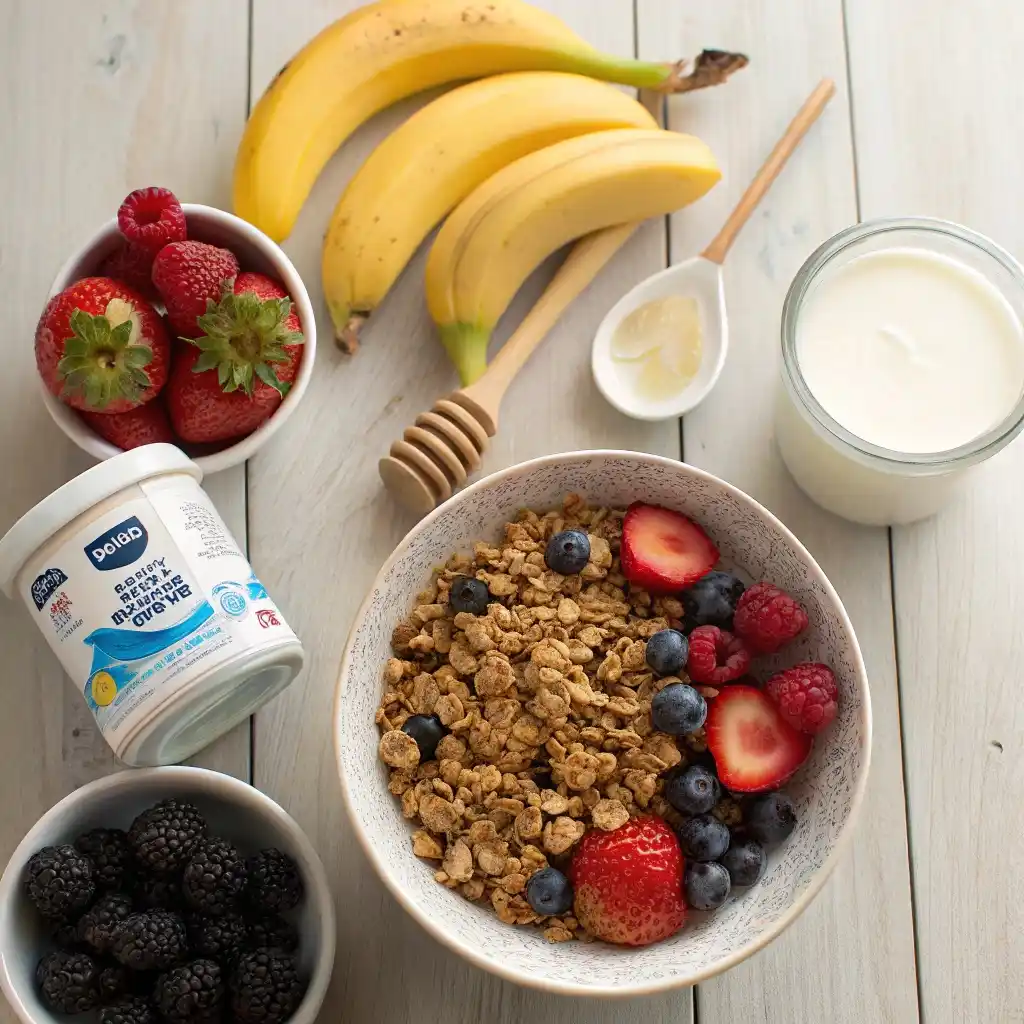Breakfast is often regarded as the most important meal of the day, laying the foundation for energy, focus, and overall well-being. Among the many choices, the debate between milk and yogurt has become central to modern breakfast discussions. Both options are versatile and nutritious, but their unique properties make them suitable for different dietary preferences and lifestyles. This guide delves into the history, nutrition, and benefits of milk and yogurt to help you decide which is better for your breakfast routine.
Historical Context
Milk and yogurt have long been dietary staples, with their roles evolving through centuries of culinary traditions.
- Milk: Milk’s journey as a breakfast companion began in ancient civilizations where it was consumed fresh or used in porridges. Its pairing with cereal in the late 19th century revolutionized breakfast culture, making it a household staple worldwide.
- Yogurt: Originating thousands of years ago in the Middle East and Mediterranean regions, yogurt was prized for its creamy texture, tangy taste, and long shelf life. In Western cultures, yogurt gained popularity in the mid-20th century, promoted for its health benefits and versatility in breakfast recipes.
Both milk and yogurt have cemented their places as breakfast essentials, valued for their nutritional contributions and adaptability.

Nutritional Overview of Milk
Milk is a powerhouse of essential nutrients, making it a valuable addition to any breakfast.
- Calcium and Vitamin D: Milk is one of the best sources of calcium, crucial for building strong bones and teeth. Fortified milk also provides vitamin D, enhancing calcium absorption and supporting immune health.
- Protein: Milk contains high-quality protein that helps repair and build muscles, making it an excellent choice for active individuals or those recovering from exercise.
- Hydration: As a liquid, milk contributes to hydration, a vital aspect of kickstarting your day after hours of fasting during sleep.
- Potassium: This mineral in milk helps regulate blood pressure and maintain proper muscle function.
Milk’s mild flavor and smooth consistency pair well with a variety of breakfast options, from cereals to smoothies, making it a convenient and nutritious choice.
In the yogurt vs. milk debate, both options have historical and nutritional significance. Milk’s classic appeal and rich nutrient profile make it a cornerstone of traditional breakfasts. Up next: an exploration of yogurt’s unique benefits and modern rise as a breakfast favorite.
Nutritional Overview of Yogurt
Yogurt is a nutrient-dense food that brings several unique benefits to the breakfast table. Known for its creamy texture and tangy flavor, it is particularly valued for its probiotic content, which supports digestion and gut health. Probiotics, the live bacteria present in yogurt, help balance the gut microbiome, improving digestion, nutrient absorption, and immune function. Regular consumption of yogurt with probiotics has also been linked to reduced inflammation and enhanced overall well-being.
In addition to probiotics, yogurt is an excellent source of protein, particularly Greek yogurt, which contains significantly higher protein levels compared to regular yogurt. This makes it a filling breakfast option that promotes muscle repair and helps maintain satiety throughout the morning. Yogurt is also rich in essential vitamins and minerals, including calcium, which supports strong bones and teeth, and vitamin B12, crucial for energy production and nerve function. Depending on the variety, some yogurts may also be fortified with vitamin D.
The diversity of yogurt options, from plain and flavored to low-fat and plant-based varieties, makes it a versatile and adaptable breakfast choice.
Comparing Milk and Yogurt for Breakfast
Milk and yogurt share many nutritional similarities but also have distinct differences.
- Calories: Milk typically contains fewer calories than full-fat yogurt, but low-fat and non-fat yogurt options can match milk’s calorie count.
- Protein: Greek yogurt often has twice the protein content of milk, making it a superior choice for those seeking a protein-rich meal.
- Calcium: Both are excellent sources, but yogurt also offers probiotics that milk lacks.
- Vitamins: Milk provides vitamin D and B12, while yogurt may include probiotics and more customizable fat content.
Each option’s nutritional profile suits different dietary needs, whether for weight management, muscle repair, or gut health.
Taste and Texture Differences
Milk and yogurt differ in how they enhance the breakfast experience. Milk’s light, smooth texture pairs well with flaky and sugary cereals, creating a refreshing and simple combination. Yogurt’s creamy and tangy profile, on the other hand, is perfect for granola, muesli, or protein-packed cereals. It binds toppings like fruits and nuts, creating a hearty and satisfying breakfast.
Situationally, milk works well for quick, traditional breakfasts, while yogurt is ideal for those seeking a filling, nutrient-dense option. Both have unique qualities, and experimenting with them can help you find your perfect breakfast companion.
Health Benefits of Milk in Milk vs. Yogurt for Breakfast
Milk is a classic breakfast staple, offering a range of health benefits that make it an excellent choice to start the day.
- Bone Health: Milk is a top source of calcium and is often fortified with vitamin D, both of which are crucial for maintaining strong bones and teeth. Regular consumption of milk can help prevent bone-related issues such as osteoporosis.
- Hydration: As a liquid, milk contributes to hydration, replenishing the body after a night of fasting during sleep. Its natural electrolytes, including potassium, also help maintain fluid balance.
- A Balanced Diet: Milk contains high-quality protein, essential for muscle repair and growth, as well as vitamins like B12 for energy and metabolism. Its mild flavor and versatility make it a key component of a balanced breakfast, pairing well with a variety of foods.
Health Benefits of Yogurt in Milk vs. Yogurt for Breakfast
Yogurt is a nutrient-packed breakfast option known for its rich texture and unique health advantages.
- Gut Health: Yogurt contains probiotics, live bacteria that promote a healthy gut microbiome, improving digestion and nutrient absorption. Regular consumption can also support immune health and reduce inflammation.
- Satiety: With its high protein content, especially in Greek yogurt, it helps keep you full longer, making it an excellent choice for weight management and energy throughout the day.
- Versatility: Yogurt can be tailored to different preferences and dietary needs, from non-fat to full-fat and plant-based varieties, making it a flexible and customizable breakfast ingredient.
Best Pairings with Milk
Milk’s light and neutral flavor complements a variety of breakfast options:
- Cereal: The classic pairing, with milk softening cereals and enhancing their flavor.
- Oatmeal: Milk adds creaminess and a nutrient boost to traditional oatmeal.
- Beverages: Milk works well in coffee, tea, or as a base for lattes and hot chocolate, providing a rich texture and added nutrients.

Best Yogurt Pairings in Milk vs. Yogurt for Breakfast
Yogurt’s creamy texture and tangy flavor make it ideal for diverse pairings:
- Granola: Its crunch contrasts beautifully with yogurt’s smoothness.
- Fruits: Fresh berries, bananas, or apples add natural sweetness and fiber.
- Smoothies: Yogurt serves as a creamy base for nutrient-packed breakfast smoothies.
- Parfaits: Layer yogurt with granola, fruits, and honey for a visually appealing and nutritious treat.
Both milk and yogurt shine as breakfast staples, offering unique benefits and pairings to suit any taste or dietary preference.
Dietary Considerations in Milk vs. Yogurt for Breakfast
When choosing between milk and yogurt for breakfast, it’s essential to consider dietary needs and restrictions.
- Lactose Intolerance: Lactose intolerance affects a significant portion of the population, making it challenging to digest traditional dairy products. While both milk and yogurt contain lactose, yogurt is often easier to digest due to its probiotic content, which helps break down lactose. Lactose-free milk and plant-based yogurts or milks, such as almond, soy, or oat, provide excellent alternatives.
- Calorie-Conscious Choices: For those monitoring calorie intake, options like skim milk or low-fat yogurt are ideal. Skim milk is lower in calories while retaining essential nutrients like protein and calcium. Similarly, non-fat or low-fat yogurts, including Greek varieties, offer high protein and probiotics without the added fat and calories of full-fat options.
- Special Diets: Yogurt’s versatility makes it a favorite for specialized diets. High-protein Greek yogurt supports muscle repair for athletes, while plant-based yogurts cater to vegan lifestyles. Milk, often fortified with vitamins, is suitable for those needing additional nutrients, but plant-based milks can also be enriched with calcium, vitamin D, and B12 to align with specific dietary needs.
Global Trends in Milk vs. Yogurt for Breakfast
Milk and yogurt play pivotal roles in breakfasts worldwide, reflecting cultural traditions and preferences:
- Western Countries: Milk is a breakfast staple in the West, particularly with cereal or as a beverage with coffee or tea. Yogurt has also gained popularity, often paired with granola or blended into smoothies for a modern, health-focused meal.
- Mediterranean and Middle Eastern Cultures: Yogurt has deep roots in these regions, where it is commonly consumed as a breakfast item. Thick, tangy yogurt, often referred to as “labneh,” is served with olive oil, nuts, or honey and paired with flatbreads or grains like muesli.
- Asian Countries: In many Asian cultures, yogurt is increasingly popular in urban settings, particularly as a probiotic-rich option in health-conscious diets. Milk, on the other hand, is often used in teas or porridge-like dishes such as congee.
- Northern Europe: Dairy-heavy breakfasts often feature yogurt or milk in forms like buttermilk or kefir, paired with rye breads, muesli, or fruits.
Both milk and yogurt offer unique opportunities for personalization and innovation, allowing individuals to adapt these staples to their dietary needs and cultural preferences. The variety of options ensures that everyone, regardless of location or restriction, can enjoy a balanced and delicious breakfast.
FAQs About Milk and Yogurt for Breakfast
- What are the main benefits of milk and yogurt for breakfast?
Milk provides essential nutrients like calcium, vitamin D, and protein, making it great for bone health and muscle repair. Yogurt adds probiotics that support gut health and offers a creamier, customizable option for breakfast. - Are milk and yogurt suitable for lactose-intolerant individuals?
Those with lactose intolerance can opt for lactose-free milk or yogurt. Plant-based alternatives like almond milk, soy yogurt, or coconut yogurt are also excellent options. - Can I use flavored milk or yogurt with cereal?
Yes, but be mindful of added sugars. Choose lightly sweetened or unsweetened varieties to control your sugar intake. - How can I incorporate milk and yogurt into breakfast recipes?
Milk works well in smoothies, oatmeal, or alongside cereal. Yogurt is versatile for parfaits, granola bowls, and as a smoothie base. - What are the best plant-based alternatives?
Popular options include almond, soy, oat, and coconut milk, as well as plant-based yogurts made from these ingredients. Look for fortified varieties to ensure they provide comparable nutrients to dairy.
Where to Buy the Best Milk and Yogurt
- Local Grocery Stores: Most supermarkets carry a wide variety of milk and yogurt options, including organic, plant-based, and flavored choices. Look for products with minimal processing and added sugars.
- Farmers’ Markets: For high-quality, fresh milk and yogurt, visit local farmers’ markets. These often feature small-batch or artisanal products that may offer superior taste and nutritional value.
- Specialty Stores: Health food stores often stock unique and premium options, such as grass-fed milk or probiotic-rich yogurts.
- Online Retailers: Platforms like Amazon, Thrive Market, or specialty dairy websites provide access to hard-to-find or niche products. Look for trusted brands with clear labeling and customer reviews.
When selecting products, check expiration dates, ingredient lists, and certifications (e.g., organic, non-GMO) to ensure quality.
Conclusion
The debate between yogurt and milk as the better breakfast choice highlights the diversity of preferences and needs among individuals. Milk offers a simple, hydrating, and nutrient-rich option, while yogurt provides additional benefits like probiotics and versatility for creative recipes. Both are excellent choices, and the decision depends on factors like dietary restrictions, taste preferences, and nutritional goals.
Ultimately, incorporating both milk and yogurt into your breakfast routine allows for variety and balance. Whether you enjoy milk’s classic simplicity or yogurt’s creamy tang, experimenting with different pairings and toppings ensures a delicious and healthful start to your day.
You May also be Interested in:

